
You don’t normally associate William Wyler with witty comedies or comedies of any kind, but early in his career he made this sparkling film with Margaret Sullavan (who married Wyler during the course of the filming) and Herbert Marshall. Since it it so out of character, there’s a tendency to credit The Good Fairy‘s (1935) success to screenwriter Preston Sturges who adapted Ferenc Molnar’s play for this version. And there’s no doubt that Sturges’ fingerprints are all over the script—for starters no one but Sturges is likely to have envisioned a hero whose great desire in life is the acquisition of a crank-type pencil sharpener—but the direction belongs to Wyler and it makes you wish the man had turned his hand to comedy more often. The film charts the story of Luisa Ginglebuscher (Sullavan), an orphan who gets a job fresh from the orphan asylum as an usherette in a picture palace movie theater where she directs patrons with a kind of fairy wand. It’s there that she meets Detlaff the waiter (Reginald Owen), who takes her under his wing and appoints himself her protector—especially from the advances Konrad (Frank Morgan), a wealthy meat packer who has designs on the girl. Keeping Konrad at bay by telling him that she’s married, Luisa ends up picking a husband out of the phone book—a poor lawyer, Dr. Max Sporum (Marshall)—whom Konrad promises to make “just regular rich.” Amusing complications and a good deal charm follows. An often overlooked little gem.
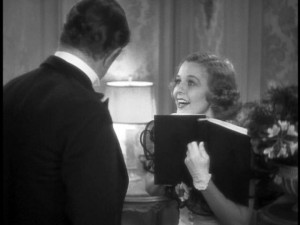
The film retains Molnar’s Budapest setting (in that effortless manner that was the special province of Universal and Paramount in the 1930s), but has in many ways Americanized the proceedings, especially as concerns some of the gags. The film’s depiction of an orphanage may or may not be authentic, but it certainly feels sufficiently foreign—even if the place is overseen by the essentially midwestern Beulah Bondi. For that matter, no one makes any actual effort to seem Hungarian. In fact, the family that walks out on the satirically awful parody movie (an invention of Sturges) being shown in the course of the story is distinctly American. (So is the now mostly forgotten practice of going to a movie in progress and just sitting through the next show till you get to “where we came in.”)
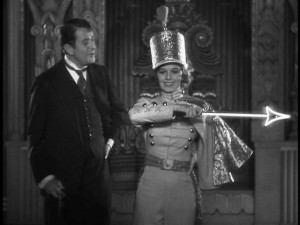
The tragic Margaret Sullavan was just getting her uneven and relatively brief career started at this point. The Good Fairy was her third and final film for Universal (they quickly lost her to Paramount) and the first to showcase her talent for comedy—something that was never exploited to the degree it should have been in her subsequent movies. Sullavan projected a believable sense of innocence and vulnerability that was well suited to the type of comedy seen here. In fact, it’s hard to imagine anyone else quite pulling off a role that requires the level of unworldliness as this. The character’s background in the orphanage leaves her so completely unprepared for the real world that she has to make up her reactions to everything as she goes along—not always with the best results.
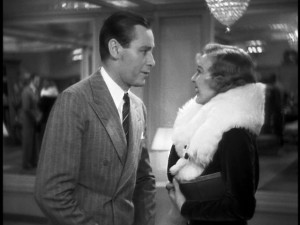
Luisa more or less just falls into and adapts to each of the film’s situations. Having “met” Detlaff by directing him to his seat in the theater, she quickly latches onto him as her supposed husband when she sees him on the street and needs to ditch a stagedoor Johnny (Cesar Romero in a bit part) who’s hitting on her. Feeling protective of this innocent, he takes her to a beer garden for dinner (where he at first mistakes her references to having “just left the asylum” for something other than an orphan asylum), and then to the posh restaurant where he works. It’s there that she attracts the attentions of Konrad, whose advances she staves off with yet another invented husband. This, however, sets off a new plan for pursuing her—by giving her the good things in life by making her imaginary husband wealthy. (Apparently, the way to a woman’s heart might be through her husband’s bank account.) In Luisa’s unworldly mind, this is a chance to do a good deed by playing “good fairy” to the poor lawyer she finds in the telephone directory and claims is her husband.
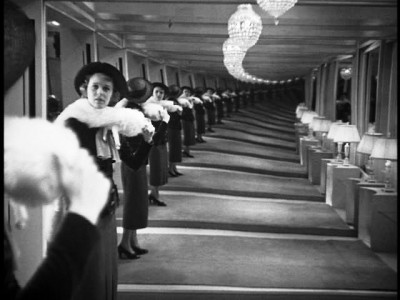
Being the kind of film it is, it follows that she will become romantically involved—albeit in the most innocent way—with Max Sporum, who, of course, has no clue that his sudden good fortune is in any way related to her. As a plot it’s the sort of thing that was fertile ground to Preston Sturges’ talents for creating a gallery of eccentic and amusing characters with foibles and odd affectations that offer the illusion of reality without being mundane. There’s something satirical and yet touching about Luisa’s simple desire for a “genuine Foxine” stoll (even when it’s dismissed by Konrad as cat “and not very good cat”). And it nicely complements Max’s own fixation over his new pencil sharpener. Sturges’ gift for blending the sophisticated with the simple, the cynical with the sentimental has rarely been better evidenced than it is here.
The Asheville Film Society will screen The Good Fairy on Tuesday, March 13, at 8 p.m. in the Cinema Lounge of The Carolina Asheville and will be hosted by Xpress movie critics Ken Hanke and Justin Souther. Hanke is the artistic director of the A.F.S.



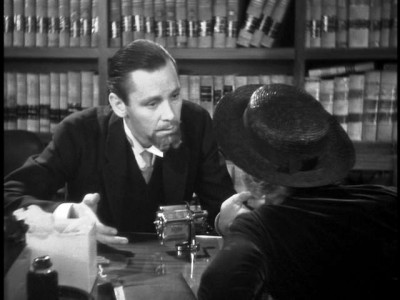
Before you comment
The comments section is here to provide a platform for civil dialogue on the issues we face together as a local community. Xpress is committed to offering this platform for all voices, but when the tone of the discussion gets nasty or strays off topic, we believe many people choose not to participate. Xpress editors are determined to moderate comments to ensure a constructive interchange is maintained. All comments judged not to be in keeping with the spirit of civil discourse will be removed and repeat violators will be banned. See here for our terms of service. Thank you for being part of this effort to promote respectful discussion.